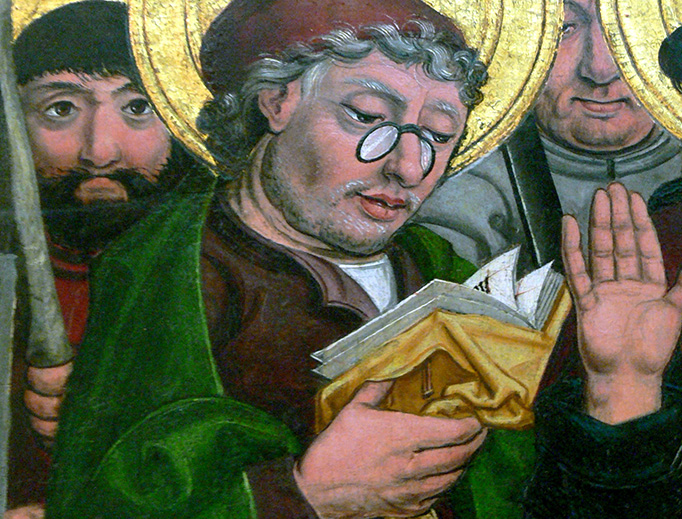A New Biblical Argument for Apostolic Succession
“What Christ entrusted to the apostles, they in turn handed on by their preaching and writing, under the inspiration of the Holy Spirit, to all generations, until Christ returns in glory.” (CCC 96)

The classic argument for apostolic succession is this passage:
Acts 1:16-26 “Brethren, the scripture had to be fulfilled, which the Holy Spirit spoke beforehand by the mouth of David, concerning Judas who was guide to those who arrested Jesus. For he was numbered among us, and was allotted his share in this ministry. … For it is written in the book of Psalms, ‘Let his habitation become desolate, and let there be no one to live in it;’ and ‘His office let another take.’ So one of the men who have accompanied us during all the time that the Lord Jesus went in and out among us, beginning from the baptism of John until the day when he was taken up from us — one of these men must become with us a witness to his resurrection.” And they put forward two, Joseph called Barsabbas, who was surnamed Justus, and Matthias. And they prayed and said, “Lord, who knowest the hearts of all men, show which one of these two thou hast chosen to take the place in this ministry and apostleship from which Judas turned aside, to go to his own place.” And they cast lots for them, and the lot fell on Matthias; and he was enrolled with the eleven apostles.
Acts 1:20 even uses episkopos (“bishop”/“office” in RSV; “bishoprick” in KJV) to describe Judas, who was succeeded by Matthias. This is where Catholics derive the idea that the bishops are the successors of the apostles. Since Paul received and passed on or delivered oral and written tradition, successors to the apostles would do the same thing.
The Bible actually teaches that the apostles didn’t cease. But Catholics interpret this as teaching that they continue in the person of the bishops (Acts 1:16-26). St. Paul shows no sense of the cessation of Apostles in these passages:
- 1 Corinthians 12:28-29 And God has appointed in the church first apostles, second prophets, third teachers, then workers of miracles, then healers, helpers, administrators, speakers in various kinds of tongues. Are all apostles? Are all prophets? Are all teachers? Do all work miracles?
- Ephesians 4:11-12 And his gifts were that some should be apostles, some prophets, some evangelists, some pastors and teachers, to equip the saints for the work of ministry, for building up the body of Christ,
Note how “prophets” are also included in both passages, alongside “apostles” and in the same list with categories like teachers, administrators, tongues-speakers, helpers, evangelists and pastors. If all those offices haven’t ceased, why would we think the office of apostles would? The New Testament continues to refer to existing prophets:
- Acts 11:27-30 Now in these days prophets came down from Jerusalem to Antioch. And one of them named Agabus stood up and foretold by the Spirit that there would be a great famine over all the world; and this took place in the days of Claudius. And the disciples determined, every one according to his ability, to send relief to the brethren who lived in Judea; and they did so, sending it to the elders by the hand of Barnabas and Saul.
- Acts 21:10-11 While we were staying for some days, a prophet named Agabus came down from Judea. And coming to us he took Paul’s girdle and bound his own feet and hands, and said, “Thus says the Holy Spirit, ‘So shall the Jews at Jerusalem bind the man who owns this girdle and deliver him into the hands of the Gentiles.’”
The authority of this prophet Agabus (backed up by “the Spirit”) was so acknowledged, that (in Acts 11) “the disciples” accepted it, as did Paul and Barnabas — through whom relief was sent, following the prophet’s prediction of famine. This was an oral proclamation from a prophet, led by the Holy Spirit, after the Church had begun at Pentecost.
He then prophesied to St. Paul himself, saying, “Thus says the Holy Spirit” and Paul fully accepts it. This is, again, non-biblical and non-apostolic (and oral, not written) infallibility:
- Acts 13:1 Now in the church at Antioch there were prophets and teachers, Barnabas, Simeon who was called Niger, Lucius of Cyrene, Manaen a member of the court of Herod the tetrarch, and Saul.
- Acts 15:32 And Judas and Silas, who were themselves prophets, exhorted the brethren with many words and strengthened them. (cf. Luke 2:36)
St. Paul matter-of-factly refers to the continuing existence of “prophetic powers” (1 Corinthians 13:2), and even “revelation” in the following passage (and related ones noted at the end), which has frequent reference to prophets, prophecies and prophesying:
- 1 Corinthians 14 What then, brethren? When you come together, each one has a hymn, a lesson, a revelation, a tongue, or an interpretation. Let all things be done for edification. … Let two or three prophets speak, and let the others weigh what is said. If a revelation is made to another sitting by, let the first be silent. For you can all prophesy one by one, so that all may learn and all be encouraged; and the spirits of prophets are subject to prophets. … If any one thinks that he is a prophet, or spiritual, he should acknowledge that what I am writing to you is a command of the Lord. … So, my brethren, earnestly desire to prophesy, and do not forbid speaking in tongues; (cf. 11:4-5; 14:1, 3-5, 24; Acts 19:6; 21:9; Ephesians 3:4-5; 1 Thessalonians 5:20; 1 Timothy 1:18; 4:14; Revelation 11:3, 6, 10; 10:11)
- Keywords:
- apostolic succession












